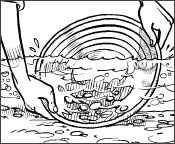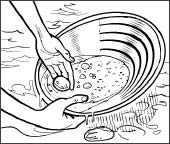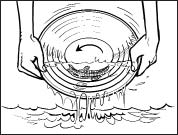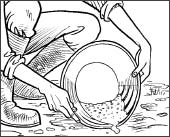The Time Travelers' Handbook (4 page)
Read The Time Travelers' Handbook Online
Authors: Lottie Stride

Splash!
The good news is you have landed in the new state of California, on the west coast of the U.S.A. The bad news is you have landed in a river.
In front of you is a man holding a pan half in, half out of the water and he is swirling around what looks like mud and pebbles. The man's staring down at the pan very hard.
All of a sudden, he gives a shout, throws his hat in the airâand that's when you see that there is something interesting in the pan after all. A small chunk of metal is glittering in the dirt at the bottom of his pan. Gold!
The Forty-Niners
When he has stopped jumping for joy, he introduces himself as Nathaniel. Gold was discovered in this river in March 1848. At first, people didn't believe the newsâthey thought it was just a government scheme to get folks to move west to California from their comfortable homes in the east. Now, thousands of people have rushed here to strike it rich.
They call it “gold fever.” People seem to have gone crazyâobsessed with the idea of finding gold. The people that came here are called “Forty-niners” because many of them arrived in 1849. Since then, new towns have been springing up.

A Flash In The Pan
Your friend is one of the lucky Forty-niners. He came early when there was still gold to be had. Back then, he was panning nearly $100 a day. He brought along his whole family, selling everything they had to get hereâtheir house, their furniture, even their dog. They traveled more than 2,000 miles across the continent.
Now, Nathaniel's noticed he is finding far less gold. It's running out. Today's find was his first in weeks. But more people are arriving every day. They spend up to 10 hours a day, standing in freezing water panning for gold, but find nothing.
Making Money
Along with all the people looking for gold, known as prospectors, others have arrivedâmerchants and con men. They are hated. They make their money by buying up every bit of gold-panning equipment in the area, and then selling it at many times the original price. Others charge huge amounts for food and supplies. Those prospectors who do not find gold can't afford food at these incredible pricesâsome even starve to death.
Panning for Gold
Nathaniel is not too downcast. One Forty-niner pulled a nugget the size of a turkey egg out of this riverâright where you are standing, he tells you. He offers you a pan, and shows you how to pan for gold.

1.
Fill your pan about half full with the mixture of dirt and gravel that has collected at the banks of the river.

2.
Gently put your pan beneath the surface and fill it with water. Take it out and break up all the muddy clumps with your hands to loosen all the dirtâand perhaps gold.

3.
Drain away some of the water and take out twigs and rocks. Tip the pan beneath the surface of the water gently to fill the pan again.

4.
Now, swirl the pan near the surface of the water. Gold is heavy, so this should make it sink towards the bottom. Be gentle and take care not to slosh any dirt out of your pan.

5.
As you keep shaking, the lighter dirt rises up. Lift the pan out of the water, and tilt the front down. Water will run off the edge of the pan, taking the lighter dirt at the top with it. Any gold should be in the bottom of the pan.
You keep swirling and tipping away the dirt for what feels like ages. Nathaniel finishes his pan and fills up to start again. You are about to do the same whenâ¦you see it: something glinting in the bottom of the pan. It might not be the size of a turkey egg, but you've done itâyou've struck gold!
Unfortunately, Nathaniel reminds you that he has staked a claim to this bit of river. That means the gold is his. He gives you a slice of his wife's homemade pie insteadâhmmmâ¦

Watch out! You are about to be run over by a horse and carriage speeding toward you. You leap out of the way onto the sidewalk and take a look around. You have landed in the middle of a London street during the reign of Queen Victoria.
There are some fancy houses on either side of the road with steps going up to the main door. The houses are four to five stories high, with spiked iron fences to keep people out.

As well as the steps going up to the main door, you see that there are steps going down to another door that is far less fancy.
You see a man emerging out of one of these doors. He is with two boys slightly younger than you. They are very thin and have no shoes on. Their faces are completely black with dirt and you notice that their eyes are red and watery. The street is very busy and everybody seems to be in a hurry, but you are worried about the boys and decide to go and speak to them.
Climbing Boys
The smaller of the two boys has clearly been crying and the other is trying to calm him down. You ask what is wrong and find out that they are brothers and are both working as “climbing boys,” otherwise known as chimney sweeps. They have just been cleaning the chimneys in the house you saw them leaving.
The younger boy is upset because his feet are hurting so much, he is finding it hard to walk. His older brother explains that this is his fault. He says that while they were working, their boss complained that they were taking too long. The older boy was sent up the chimney to make his little brother work faster. To hurry him along, he had to prod the soles of his brother's feet with hot pins. What's worse, they are now late for their next chimney and their boss is angry and will dock their pay.
Feeling sorry for the brothers, you offer to help out. You are a bit bigger than the youngest, but are willing to give chimney sweeping a try. The smaller boy stops crying, happy to be off the hook and the older boy quickly gives you some tips.
Top Sweep Tips
⢠Don't go to the front door of the fancy houses like the ones on this street. You will be asked to go in the tradesman's entrance. Customers don't like sooty sweeps tramping dirt through the house.
⢠When you are inside the house, don't touch anything except the chimney. Not only do you not want to make things dirty, but you also want to avoid being accused of stealing anything. If you are, you risk being sent to a horrid Victorian prison.
⢠Make sure you put lots of sheets around the fireplace to collect all the soot. If you make a mess, you will be punished and could be forced to clean the next chimney naked!
⢠When up a chimney, hold the cleaning brush in one hand and push your knees and elbows against the walls to help you climb. Shuffle up, one knee and elbow at a time, sweeping the brush ahead of you.
⢠Get to the top as quick as you can, or your friend will be sent after you to poke you in the feet with hot pins.
⢠Don't complain. These boys are lucky to have jobs. With no parents, they have nowhere else to go and would be left on the street to starve. In Victorian England, children as young as five work in factories or underground in mines.
Health Warning
⢠The inside of the chimney has lots of sharp bits of brick that can hurt your elbows, knees, and feet. If the soot and dirt get into cuts and scratches, they can become infected and start oozing pus.
⢠Try to keep your eyes shut. The soot is full of toxic chemicals that will make them sore and itchy.
⢠Try to retire young. Being a chimney sweep is very bad for your health. The soot will damage your lungs and leave your face permanently dirty. Lugging around big sacks of soot will hurt your back and leave you with hunched shoulders. When you get bigger, you will no longer be able to climb the chimney and may be too injured to work anywhere else.

After climbing up only one chimney, you decide this is not a career for you and that it is time to get out of there. You whiz back to the present to take a long soak in the bathtub. It's a shame your two new friends can't do the same.